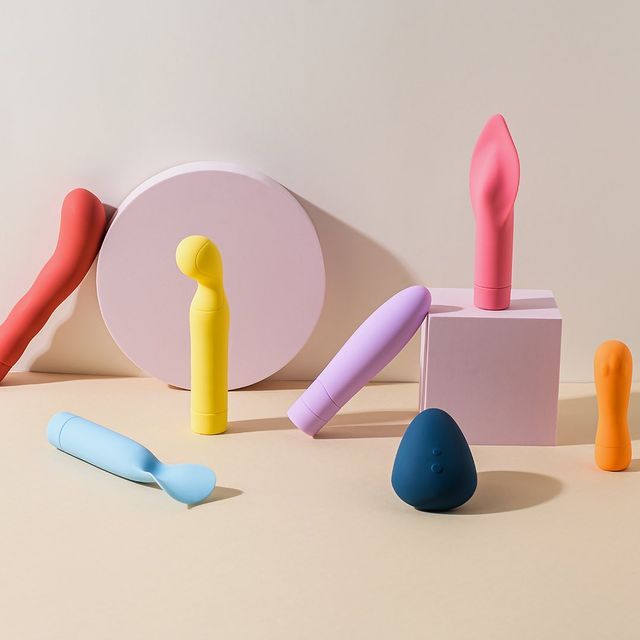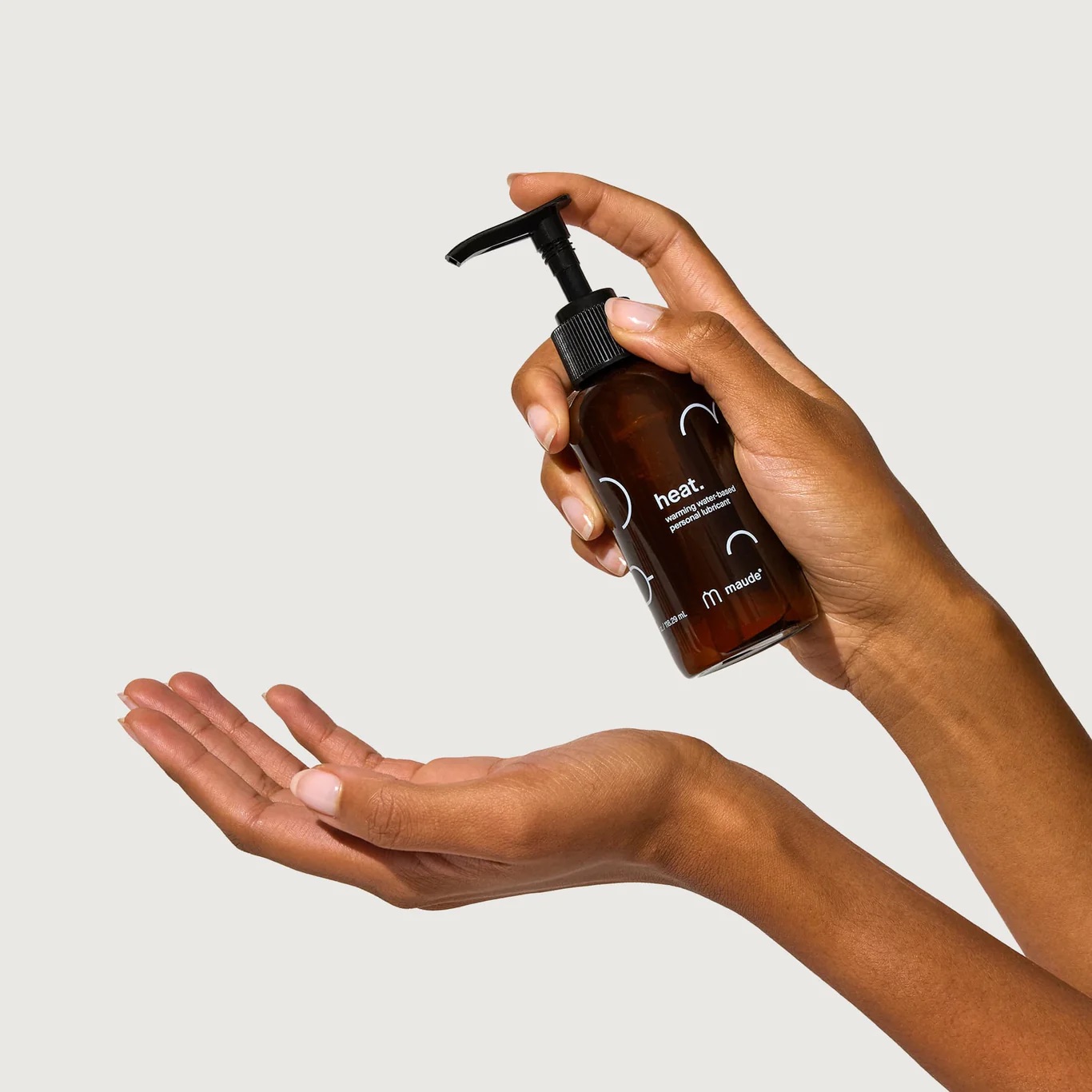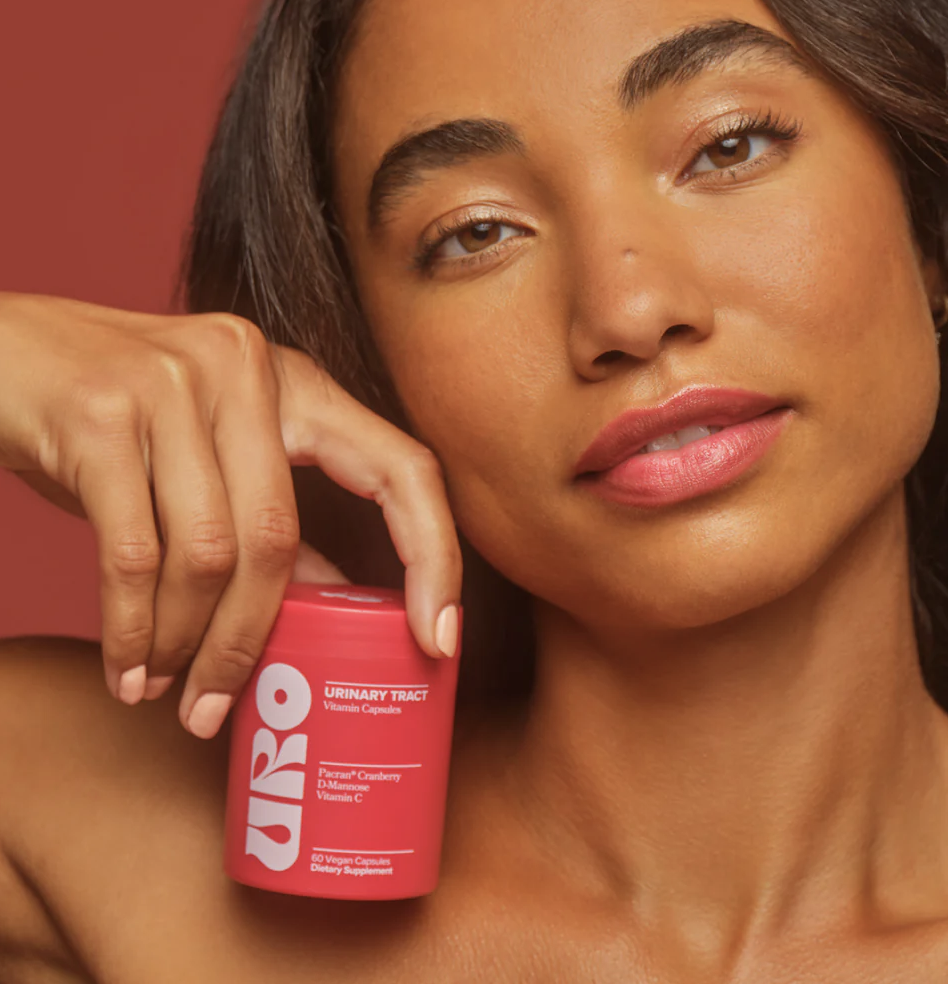
What Does A Midlife Sexual Awakening Look Like?
I was ten years old when I had my first orgasm.
It was Spring Break 1997, and my family had rented a condo in Hawaii. In the single bathroom we all shared, a thick paperback with a glossy cover showed a shirtless pioneer, bronze muscles bulging. He held the tiny waist of an otherwise buxom woman clutching what appeared to be an animal hide to her otherwise naked body. The title (which I can’t recall) and the images of their figures were embossed, begging for me to run a curious finger over each salacious curve.
Flipping through the pages, I saw the words “hips” and “hard” and “slick” and “beg.” I locked the door. I read a chapter chosen for the intriguing phrase “milky, moonlit breasts.” Lying on the brown, shag bath mat that matched the toilet cover, I read a scene where an early American outlaw happened upon a newly widowed pioneer woman bathing in a lake.
“Oh my god, I thought, thrilled and mystified and more than a little nervous. What just happened??“
I started unconsciously rocking my hips against the floor beneath me, reacting to a tingling sensation that reminded me of the nervous excitement just before the stomach drop whenever I tried the high dive at our community pool. I read and re-read the scene as the sensation in my body grew, until a warm feeling surged out from my vulva through every nerve ending, peaking as all my muscles tensed in what felt like the most delicious, involuntary full-bodied stretch of my life. All at once, everything relaxed into a gentle, deep pulsing in my pelvis.
Oh my god, I thought, thrilled and mystified and more than a little nervous. What just happened??
It was an accident, and it would take me many years to learn to call this feeling by what it was — an orgasm. And it would take me even longer to learn how to consistently have one with a partner.
Sex education
As the only girl in my 5th grade class with a period and a bra, I had a heightened awareness of my body and its changes around that fateful spring of 1997. I didn’t feel ashamed exactly, but I was instinctively private and protective of each new event and feeling. So even though my mother encouraged open, judgment-free dialogue (she was amazing!), I couldn’t bring myself to ask my mom about what happened to me while I’d been humping the communal bath mat on our family vacation.
“I couldn’t bring myself to ask my mom about what happened to me while I’d been humping the communal bath mat on our family vacation.”
When I finally did learn the words for it — arousal, masturbation, climax — it wasn’t through an official sex education channel. The health curriculum for the Texas public education system of the late nineties focused strictly on reproduction and puberty, skipping over anything related to sexual desire or pleasure. In our family church’s annual abstinence-only program called “Sex, God, and Me,” we were promised ecstasy if we waited to have sex until marriage, and if we didn’t, a lifetime of low-key misery. And probably an STI.
“I had to learn about orgasms through the more traditional channels for those of us coming of age in the early aughts: Gossip and the media.”
I had to learn about orgasms through the more traditional channels for those of us coming of age in the early aughts: Gossip and the media.
Seventh grade was the year I first remember hearing about classmates “fooling around.” It was through covert screenings of teen dramas on the WB (now the CW) where I saw visual depictions of what these stories looked like.
The problem with gossip as pedagogy is that there is no syllabus and no vocabulary list with universally agreed-upon definitions. The internet was still dial-up, and there was no Wikipedia or Urban Dictionary. We were left to suss out this new world and its words completely on our own.
“The problem with gossip as pedagogy is that there is no syllabus and no vocabulary list with universally agreed-upon definitions.”
Feeling up seemed fairly self-explanatory, but what in the world was eating out? Why was everything that you could do to a penis called a job? Even the term hookup was elusive and changeable — it could mean a simple makeout session or full-blown sex, depending on the context. Worse, all these vague terms were batted around with the sort of worldliness that made it impossible for an innocent like me to feel empowered to ask for clarification. Instead, I’d fake a knowing expression, and stayed on the lookout for context clues.
Despite all the chatter, I never heard about girls orgasming. But I saw it on TV — the seamless way each couple moved from kissing to disrobing to the moment when they both suddenly stopped and gasped in a way suggesting that they had, somewhere just off-camera, successfully inserted a penis into a vagina. Then came the 45 seconds of movement that resulted, always, in what had all the appearances of a simultaneous orgasm.
This sort of education left us with some gaps. And the largest, most egregiously overlooked piece of the puzzle? That sex doesn’t actually look like this. At all.
“The largest, most egregiously overlooked piece of the puzzle? That sex doesn’t actually look like this. At all.”
Everything about these scenes — from the logistics of taking off each other’s clothes, to the rate of escalation from kissing to penetration, to the lack of discussion of birth control, to the smooth, hands-free mounting that achieved an almost instantaneous climax for both partners — was, to put it mildly, inaccurate. It nonetheless created a powerful template in the impressionable minds of many teens who didn’t have more reliable sources of information to depend on. For those of us not gifted with the biological ability to orgasm on demand, the sense that we were expected to do so was a rocky introduction to sex.
Yet we, as they say, persevered. Partially educated but armed with countless images of beautiful girls having easy orgasms on our teen dramas, this is how my generation launched our sex lives — wearing matching Victoria’s Secret lingerie, spray tanned and waxed from the neck down, ready to fake it til we make it.
How bad could this go?
Sex without pleasure
Early in my senior year of high school, I paused mid-makeout on my boyfriend’s futon to make an announcement: “I think we should have sex.” He looked dazed, his hair sticking up in all directions. We’d been kissing and dry humping for literal hours. I could feel how raw my chin was from his stubble. We’d been kissing so long that both our mouths were dry. And yet, we couldn’t stop. If this is what it feels like just to kiss, I figured, then actual sex had to feel even better.
“If this is what it feels like just to kiss, I figured, then actual sex had to feel even better.”
He’d had sex before, so I figured he could guide us through it. He bought the condoms and I counted down the seconds until I would finally get to experience the magical, world-stopping pleasure of my very first orgasm with a partner.
Reader, I don’t think it will be a surprise to learn how the two minutes my boyfriend spent thrusting his penis inside of me ended. Was there an orgasm? Yes. Was it mine? Much to my shock — no. He came, and then he cuddled me for a little while, and then I went home. It was the most underwhelming experience of my life at that point, a build-up that ended in the proverbial whimper instead of the expected bang.
“It was the most underwhelming experience of my life at that point, a build up that ended in the proverbial whimper instead of the expected bang.”
What happened? I wondered. Did I do something wrong? Did he?
Nothing played out how it was supposed to. Taking off all our clothes was awkward — we both had to stand up at different points, and my bra clasp got caught in my hair. When he paused to put on the condom, he sat back on his heels — a move that made him look like a child to me in a moment when the last thing I wanted to be thinking about was children. Once I became aware of the smell of latex on his hands, it was all I could focus on. It required a fair amount of effort and re-positioning for us to actually get his penis into my vagina, and when it was finally in, the sensation was decidedly not the instant bliss depicted on all the teen shows. It felt like… fullness, sort of. Right before he finished, he started humping me with the sort of abandon that, had I been in another mindset, would’ve been extremely funny. He had one foot on the top of my ankle, gripping it with his toes for leverage. He was still wearing socks.
I was confused, disappointed. I didn’t really know if the problem was just my own, because no one was talking about the particulars of their sex lives, let alone the presence or quality of their own orgasms. My girlfriends who had experienced various kinds of sex mostly discussed it in terms of affection or to illustrate the emotional state of the relationship. They never mentioned how they felt while they were hooking up, whether they were physically satisfied at the end or left wanting more.
“I didn’t really know if the problem was just my own, because no one was talking about the particulars of their own orgasms.”
So I went into my twenties thinking that sex was more about feeling close to my partner than achieving any physical sensation myself. Maybe orgasms were something I would enjoy privately, not with a partner. And this was fine. I could be okay with this. My partners were fine — they touched me and seemed interested in making me feel good, but they weren’t preoccupied with whether or not I actually came — not to the degree that we both seemed about preventing the terrifying specter that was “blue balls.”
The sitcom and romcom post-coital question of the time, “Was it good for you?” seemed broad enough to cover all ranges of experience. “Yeah,” I could say honestly, if asked. Because it was usually fine, nice even. Sex wasn’t like what I was seeing on TV or in the movies, but those people were characters played by actors — they never used condoms and could somehow take their pants off without having to stand up. Everything about those scenes was totally made up, completely fake. I had been to the other side, and now I knew the truth: No one could climax from penetration.
Right?
The awakening
Okay, let’s cut to the chase here: I am almost 40 years old, married ten years, mother of one, and it was only in the last few years that I learned how to consistently orgasm with my partner. (If you are related to either my spouse or me and you’ve read this far, feel free to stop right about here. 😘)
“I am almost 40 years old, married ten years, mother of one, and it was only in the last few years that I learned how to consistently orgasm with my partner.”
My husband is a generous and enthusiastic partner in every way. But listen, you don’t know what you don’t know. And the truth is that I had been so conditioned to be a certain way, that it took me a long time to get over the expectations of behaving like a primetime network TV character having sex: Obliging, satisfied, and above all else, physically sexy at all times. I treated every moment during sex as if I were in a public boudoir shoot, posing and focusing on my angles, trying to position myself to always be in the most flattering light. This means that I was giving myself a running inner monologue of criticism about my body, reacting to every perceived flaw and laboring to correct it. You can imagine how this didn’t promote the sort of conditions friendly to an orgasm.
Since I knew I could make myself come, I always thought this would automatically translate to knowing what and how to do so with a partner. This is where I always hit a roadblock — at the collision of the two very powerful worlds of limited sex education and the cultural indoctrination of How To Be A Desirable Woman. Because (spoiler alert!) achieving orgasm usually requires a kind of animal abandon that looked absolutely nothing like the gently mussed-up women in the media that I thought I was supposed to look like.
Touching myself is about sensation, about following each reaction from my body and responding to it. It doesn’t matter what I’m wearing, how I position my body, what sounds or faces I make — I don’t have to perform, because no one is watching me. Which is why even in the instances when my partner and I engaged in mutual masturbation, I couldn’t bring myself to do so with the red-faced enthusiasm that would actually make me come — opting instead for a kind of “pretty” version that definitely would not make me come. It felt like a lost cause. How could I ever show someone else how to make my body orgasm when what made masturbation so successful was exactly the opposite of what it was like to have sex with a man?
“How could I ever show someone else how to make my body orgasm when what made masturbation so successful was exactly the opposite of what it was like to have sex with a man?”
In other words, even after we got married, my husband had no idea I was often left wanting. I didn’t tell him, and at that point, I had probably gotten so used to the sensation that it didn’t even stand out to me as something worth mentioning.
So what changed?
Many things, all at once. I became a mother, and despite the promise that I would hate my body after pregnancy, I miraculously didn’t. I had carried a baby to term, had a vaginal birth, and breastfed just over a year. My body had changed, sure. But my relationship to my body changed profoundly: For the first time in my life, I wasn’t critical of it the way I’d been taught to be, no longer thinking of its shapes and colors and textures as “flaws.” My body was no longer something that belonged entirely to me, but to my child. And this changed everything.
“Whatever hostility I had ever felt toward my body suddenly seemed like a threat to my child — how could I dare to treat such a sacred place with anything but reverence and love?”
I felt protective of my body with the same ferocity that I felt toward my infant daughter. She had been created and formed and fed by my body. I could see how much she conceptualized my body as a location, a safe place she could turn to, somewhere that she trusted. Whatever hostility I had ever felt toward my body suddenly seemed like a threat to my child — how could I dare to treat such a sacred place with anything but reverence and love? If I ever wanted her to have a chance in hell to love her own body, to treat it with compassion and joy and respect, then I had to show her how. I had to treat my body the way I wanted her to treat her own.
Around this time, I started reading romance novels. And within months, my sex life with my husband went through a profound glow-up.
The transition was gradual and quiet, and it started well before he even became aware of it. At first, the changes were as small and as simple as this: I didn’t hide my body. If he touched a soft area, I didn’t suck it in, or rearrange myself. I didn’t avoid having rolls or worry about whether I had a double chin from certain angles. I just let my body be, and I let him see it, and I let him touch me, and I didn’t let myself engage in the self-flagellating practices of my past — I had to break this habit, whether I was in front of my daughter or not.
So I closed my eyes. I focused on what my body was feeling instead of what it looked like. I thought about the ways the women in romances learn to trust that they are desirable exactly as they are, and that they are allowed to want pleasure and to seek it out. I heard my husband’s words as if for the first time: He told me he wanted me, that he thought I was beautiful, that he wanted to make me come. I realized I hadn’t ever let myself believe him before, choosing my fear and self-criticism and anxiety over the words of my beloved and most trusted companion. He would be enthusiastically, eagerly touching me, and instead of surrendering to the experience, I would be thinking variations of Oh god, this is taking too long; I’m sure he’s getting bored! I’d worry he was secretly criticizing my body whenever he looked at it.
“I closed my eyes. I focused on what my body was feeling instead of what it looked like.”
“That’s so mean,” he told me when I admitted this to him. “It kind of sucks that’s what you’re telling yourself while I’m just really excited to be having sex with you.”
Oh, I remember thinking. I’d been treating him as though he’d broken my trust, but I was the one constantly breaking his by pretending to be satisfied when I wasn’t.
“I’d been treating him as though he’d broken my trust, but I was the one constantly breaking his by pretending to be satisfied when I wasn’t.”
It wasn’t an overnight change, and I wasn’t instantly cured of a lifetime of body-shaming indoctrination. But I wasn’t going to submit to it anymore. And this one change meant that I could not only stop thinking so much during sex, but stop thinking so much specifically about the things that made it especially challenging to actually enjoy sex.
I read more romance novels. I read hundreds of sex scenes where women were struggling with the same fears, the same mental blocks that prevented them from coming during sex with men. I flooded my mind with the male characters’ devotion to dismantling these fears, the interior narratives that revealed the single-minded joy and satisfaction they got from making their lovers come.
My husband is not a big talker in bed, and during certain key sexual activities talking is not exactly *ahem* easy, which is why I was sometimes thrown out of the moment and into my head: Instead of trusting he was more than happy to spend however long it took to make me come, when left to a mostly silent room I tended to start worrying about the time, picturing the woman I thought I was supposed to look like in that moment and panicking about all the ways I was falling short. These thoughts started to shift, slowly getting replaced with words from my books, words that melted all my pleasure-blocking walls into puddles of pure, molten bliss: I love seeing you like this. You’re doing so well. You look so beautiful when you come.
The mid-life sex talk
Much of my experience is in heteronormative sex, so while I don’t think this is all universally relateable, I don’t think I am unique. I feel confident saying this is a common enough phenomenon among women even before my generation due to the American TV marriage: Consider any sitcom before 2010 that featured a heteronormative married couple. Their dynamic always included at least one running joke that the husband was a hapless horndog and his wife was forever putting off sex. “Having a headache” is cultural wife-speak for “no sex tonight.”
“We learned that most women don’t orgasm from penetration alone. There was a public awareness of the clitoris, a collective concern about how to find it.”
But mainstream depictions of sex in the media have come a long way in the last decade. After “Sex and the City” brought women in their 30s talking bluntly about everything from golden showers to vibrators out into the open, we slowly started to see women enjoying different kinds of sex at different stages of life. We learned that most women don’t orgasm from penetration alone. There was a public awareness of the clitoris, a collective concern about how to find it. E-readers made it possible for women to discreetly read romance novels in public. Podcasts centering women’s pleasure illuminated the mysterious mechanics and concerns that plagued so many bedrooms, finding community through experiences they thought no one else might ever understand. So much that had once seemed shameful, that created loneliness or isolation, now felt less dire. We had more information, and we were able to share it effectively. We were filling in the gaps.
If you’ve read my work before, you might not be surprised to learn that I was never the person demurring in the corner when taboo topics came up. I don’t believe in TMI — I think withholding our experiences in deference to being “ladylike” and “polite” is an oppressive tool that generates shame and misinformation at best, dangerous and life-threatening conditions at worst.
I’ve had so many conversations over the years with women struggling with sex. Like me, they have grappled with certain expectations they had been taught in some way or another that made sex a challenging or stressful part of their life. In some cases, it was a chore. In others, it was a distant memory, something that went the way of Jell-O shots and jeggings.
“Women can enjoy sex, no matter what they look like, who they have sex with, or what age they are.”
Yet we’ve also seen an influx of midlife sexual coming-of-age stories lately: From “Babygirl” to “All Fours” to “Dying for Sex,” it’s clear that the story that sex is only for the young, hot, imaginary girl who haunted my twenties is a myth. Women can enjoy sex, no matter what they look like, who they have sex with, or what age they are. The silent pressure to bow to whatever authority says otherwise isn’t real. Women are allowed to want pleasure; we are intrinsically deserving of sex that feels good, from partners who are just as invested in our pleasure as we are in theirs.
Wherever you are in your sexual development, whatever sex education you received, and however your history unfolded, your sexuality is not fixed. You can always start again. You can change your goals, your habits, your outlook, and your relationship to your body. And if you need a new sex talk, one that doesn’t leave out the important parts, here’s the one I’ve been giving myself lately. I hope it inspires you to start your own re-education, one that treats your body and your pleasure with care and attention.
- Sex isn’t a single act — sex doesn’t have to be penetrative, or involve a penis.
- Ejaculation does not have to signal the end of sex. It also does not have to be the goal of sex. It is just something that happens to people with penises.
- Blue balls are not real. It is not your responsibility to prevent “blue balls.”
- You can stop having sex whenever you want to. Mid-blowjob, even. This is a non-negotiable right for your safety and autonomy. You deserve to have a partner who respects this without exception.
- Virginity is a social concept, not a tangible or measurable thing that you can “have” or “give.” However, your first sexual experience went is not foundational or indicative of what sex can or should be for the rest of your life; it’s just one event. You are allowed to forget about it.
- Whether a sexual experience is new or familiar to you is morally neutral information. It doesn’t make you “innocent” or “naive” if you have never heard of something before, and it doesn’t make you “slutty” or “experienced” if you have. You don’t have to play it cool or be ashamed of what you do or don’t know.
- Sometimes men don’t get instantly hard, despite what the media shows. It doesn’t always mean they aren’t aroused by their partner or that they don’t want to have sex.
- Sometimes women can get turned on really fast. This is not embarrassing. Being super wet is great! Your partner should be thrilled about this, so waste not a moment of worry about it.
- Sometimes women don’t get very wet, or get wet in different amounts and at different rates depending on their cycle. This is normal, and not a problem anyone needs to apologize about. There are so many great lubes out there — and lube is great.
- This is such an underrated point that I’m going to say it again: Lube is great. Actually, it’s amazing. Lube is for everyone. There is no shame in using lube, only pleasure.
- There are many erogenous zones on the body besides the genitals. Experiment with various locations and types of touch. Follow whatever feels good.
- Sex is not about performance, but exploration. It follows the rules of play and expression — there’s improv, there’s curiosity, there’s fun. You are not getting graded on this; it’s not an assignment. Don’t treat it like one!
- Trust that your partner wants you. Don’t listen to the gremlin in your head telling you mean things about your body, or making you doubt how sexy your partner thinks you are, or how much your partner wants to be there. The gremlin is a mean liar who is only there to make you weak and small. But you are hot and powerful. Banish the gremlin and admire yourself for doing so.
- Being composed and unruffled during sex is not hot; you aren’t in a boardroom, so don’t act like it. Letting go and being wild is super hot — so be an animal. It’s much easier to relax and orgasm this way.
- If he (sub in your partner’s pronouns here!) asks you to sit on his face, don’t get in your head about it. He wants you to do it. You don’t weigh too much. He can breathe just fine. He’s honestly happy to die like this, doing what he loves. Enjoy.
- Butt stuff can feel really good — even to women. You don’t have to do anything you don’t want to, but don’t automatically rule it out because you’ve been shamed into thinking it’s dirty. It’s not. You’ve got a ton of nerves down there, and everything in your pelvic floor is all so close together that stimulating multiple zones at once is a really good idea. There are so many great resources out there to learn what you can do and how to do it safely.
- You are allowed to give feedback for what you like and what you don’t — it is reasonable to expect your partner to take this feedback. It doesn’t mean anyone messed up because, again, this isn’t a test. It’s a conversation; it’s a dance. Try things, respond, ask questions, try more. No one is getting bonus points for reading minds.
- Masturbation is healthy and normal — for any gender, at any age. Invest in your self-pleasure the way you might invest in your skincare or exercise routine. Try a nice vibrator, or go old school with just your hands. Take a bath and make use of the handheld showerhead. Grind against a pillow. There’s no wrong way to do it! Masturbation is self-care, and you deserve it.
- Sex toys are not just for masturbation; they can be a great prop or tool to enhance sex with a partner. If you are having penetrative sex but you need clitoral stimulation to come, you can use a toy — this might even be more comfortable in most cases than trying to use your hand or expect your partner to perform the proverbial patting-his-head-while-rubbing-your-tummy move. Toys are not a threat to sex with a partner; they are a dear friend. Welcome them.
- Scheduling sex is not lame, or even remotely new — think about the dates you used to get ready for, the ones where you expected to have sex. Remember how you’d take the Everything Shower, the elaborate grooming and preparation that went into making sure that you were ready for the big moment? While that might sound like a lot of work to you now (or maybe it sounds fun, I don’t know!), this was essentially scheduling sex, couched in a date. Saying sex should only be spontaneous is unrealistic pressure; scheduling sex is making it a priority. Make it something to look forward to, whether you do the Everything Shower, open a bottle of bubbles and light some candles, or just show up with your favorite vibe and a bottle of lube ready to have a nice time. Schedule it.
- A sex therapist I follow reframed a common dynamic for me in a way I thought was totally brilliant: You know when your partner is interested in having sex, and in that moment you aren’t really feeling it? I used to struggle with this, thinking it was my job to just barrel through and do it anyway, because I knew I’d probably get into it once we started. I used to think of this as “maintenance sex.” (Yikes! Talk about a slippery slope!) Here’s the reframe: Instead of asking if you’re aroused now, ask yourself if you are open to being aroused. Totally different question, right?
Continuing education
Human sexuality is an organic, dynamic, ever-changing facet of every one of us. There are no fixed rules that dictate how we will change over the years, what will give us pleasure, or how often we’ll feel sexual desire. Women are sometimes subjected to the idea that once they are no longer young, or once they’ve become mothers or grandmothers, their sexuality ceases to exist. This is a patriarchal myth. And while we spent many years subjected to the sort of media that upheld this idea (how many times have we seen an old woman’s naked body as a stand-in for something repulsive or comical?) the tides have been shifting.
Thanks to shows like “Workin’ Moms,” comedians like Ali Wong, and actors like Emma Thompson who went full frontal in “Good Luck to You Leo Grande” at 63, there are plenty of women out there challenging old, worn-out narratives designed to keep us down. Seek out the content, creators, activists, and artists who can inspire you to unlearn any mindset that might no longer be serving you. Read romance novels to see what you like. The only person who gets to decide what sex looks like at each stage of your life is you. In the iconic words of Samantha Jones, “I will not be judged by you or society. I will wear whatever and blow whomever I want as long as I can breathe — and kneel.”
“The only person who gets to decide what sex looks like at each stage of your life is you.”
Some of my earlier points bear repeating, so I’ll leave you with this. These are the key takeaways I hope for you and for all women out there looking to feel empowered in naming and openly pursuing their desires. Because you are worth it. So one more time, for the cheap seats in the back:
- You have the right to say no to anything, at any time. When you say stop, everything stops. Immediately.
- You deserve to enjoy sex.
- You deserve to feel good in your body.
- You deserve to ask for what you want.
- You deserve a partner who will be as invested in your pleasure as you are in theirs.
- You are sexy, desirable, and intrinsically valuable right now, exactly as you are.
Stephanie H. Fallon is a Contributing Editor at The Good Trade. She is a writer originally from Houston, Texas and holds an MFA from the Jackson Center of Creative Writing at Hollins University. She lives with her family in the Blue Ridge Mountains of Virginia, where she writes about motherhood, artmaking, and work culture. Since 2022, she has been reviewing sustainable home and lifestyle brands, fact-checking sustainability claims, and bringing her sharp editorial skills to every product review. Say hi on Instagram or on her website.




